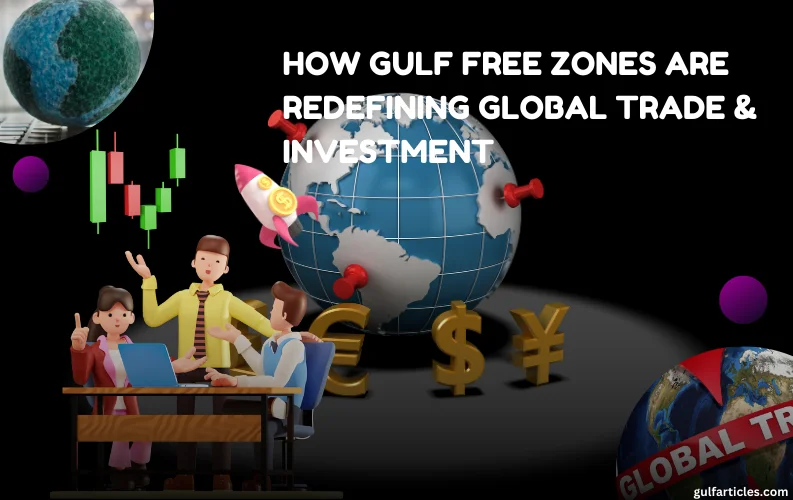The Gulf Cooperation Council (GCC) countries have emerged as key global trade and investment hubs, thanks to the establishment of free zones. These designated areas offer tax incentives, 100% foreign ownership, and simplified regulations, attracting businesses from around the world. The UAE, Saudi Arabia, Qatar, Bahrain, Kuwait, and Oman have leveraged free zones to drive economic diversification, promote foreign direct investment (FDI), and enhance global trade connectivity. This article explores how Gulf free zones are redefining global trade and investment, highlighting their impact, benefits, and future potential.
What Are Free Zones?
Free zones are special economic areas that provide businesses with significant advantages such as:
-
Tax Benefits: Exemptions from corporate and income taxes for a specified period.
-
100% Foreign Ownership: Unlike other regions where local partnerships are required.
-
Ease of Business Setup: Streamlined registration and licensing processes.
-
Customs and Duty Exemptions: No import/export duties within the free zone.
-
Full Repatriation of Profits: Businesses can transfer profits without restrictions.
These advantages make free zones attractive to multinational corporations (MNCs), startups, and investors looking for a strategic gateway to global markets.
Key Gulf Free Zones Driving Trade & Investment
1. United Arab Emirates (UAE): The Leader in Free Zones
The UAE is home to over 45 free zones, making it a global leader in this sector. Some of the most notable include:
-
Jebel Ali Free Zone (JAFZA) – One of the world’s largest free zones, contributing significantly to Dubai’s economy.
-
Dubai International Financial Centre (DIFC) – A major hub for finance and fintech companies.
-
Abu Dhabi Global Market (ADGM) – A fast-growing financial free zone with robust regulatory frameworks.
-
Dubai Multi Commodities Centre (DMCC) – A global trade hub for gold, diamonds, and commodities.
2. Saudi Arabia: Vision 2030 and Economic Zones
Saudi Arabia is expanding its free zones to align with Vision 2030, focusing on:
-
King Abdullah Economic City (KAEC) – A logistics and industrial hub designed to boost trade.
-
NEOM Economic Zone – A futuristic smart city integrating AI, renewable energy, and sustainable industries.
-
Riyadh Integrated Special Logistics Zone – Catering to e-commerce, logistics, and advanced manufacturing.
3. Qatar: Strengthening Trade and Investment
Qatar is enhancing its position as a global investment hub through:
-
Qatar Financial Centre (QFC) – Attracting international finance, legal, and consulting firms.
-
Qatar Free Zones Authority (QFZA) – Overseeing Ras Bufontas and Umm Alhoul free zones, focused on logistics, tech, and industry.
4. Bahrain: A Fintech and Logistics Hub
Bahrain’s free zones are strengthening its role in digital finance and logistics:
-
Bahrain International Investment Park (BIIP) – Targeting high-tech industries and manufacturing.
-
Bahrain Fintech Bay – The region’s first fintech-focused free zone supporting innovation in digital banking and blockchain.
5. Oman and Kuwait: Emerging Free Zone Players
-
Oman’s Duqm Special Economic Zone – A strategic trade hub connecting Asia, Africa, and Europe.
-
Kuwait’s Silk City (Madinat Al-Hareer) – A mega project aimed at transforming Kuwait into a global financial and trade center.
How Gulf Free Zones Are Reshaping Global Trade & Investment
1. Attracting Foreign Direct Investment (FDI)
GCC free zones have become magnets for FDI, with billions of dollars flowing into logistics, technology, healthcare, and finance. Investors are drawn to the region’s strategic location, business-friendly policies, and growing market opportunities.
2. Boosting E-Commerce and Digital Economy
The rise of digital trade is accelerating in Gulf free zones:
-
Dubai’s CommerCity is dedicated to e-commerce startups.
-
Saudi Arabia’s E-Commerce Hub in KAEC is transforming online retail logistics.
3. Expanding Global Trade Networks
Free zones enhance GCC nations' role in global supply chains by:
-
Offering world-class logistics infrastructure.
-
Providing seamless customs procedures.
-
Acting as re-export hubs connecting Europe, Asia, and Africa.
4. Encouraging Innovation and Startups
Several free zones are now innovation hubs, providing:
-
Funding and incubation for tech startups.
-
Special programs for AI, blockchain, and clean energy projects.
-
Collaboration between businesses, universities, and research centers.
5. Promoting Sustainability and Green Investments
New eco-friendly free zones focus on sustainability:
-
Masdar City (UAE): A clean energy and sustainability hub.
-
Green Riyadh (Saudi Arabia): An urban sustainability initiative supporting eco-friendly businesses.
Challenges Facing Free Zones in the Gulf
Despite their success, free zones face challenges that must be addressed:
1. Increasing Global Competition
-
Other regions, such as Singapore and Hong Kong, offer similar free zone advantages.
-
GCC countries must continue enhancing business incentives and infrastructure.
2. Regulatory and Compliance Issues
-
Some businesses face difficulties navigating regulatory differences between free zones and mainland jurisdictions.
-
Standardizing regulations across GCC free zones could improve ease of doing business.
3. Dependence on Oil-Funded Economies
-
Economic diversification remains crucial for the long-term success of free zones.
-
Expanding into sectors like AI, fintech, and biotech can reduce reliance on oil-driven investments.
The Future of Free Zones in the Gulf
The future of Gulf free zones looks promising, with several key trends shaping their growth:
1. Smart and Digital Free Zones
-
AI-driven regulation, blockchain-powered transactions, and digital banking will streamline business operations.
2. Cross-Border Collaboration
-
GCC countries are working on integrating free zone regulations to facilitate inter-GCC trade and investment.
3. Expansion into Emerging Sectors
-
Fintech, cybersecurity, biotech, and renewable energy will play a crucial role in the next wave of free zone development.
Conclusion
Gulf free zones are redefining global trade and investment by offering world-class business environments, attracting FDI, and integrating digital transformation. As these economic zones continue to evolve, they will play a critical role in positioning the GCC as a global business powerhouse. With continued innovation, sustainability efforts, and regulatory improvements, the Gulf’s free zones will remain central to the region’s economic success in the coming decades.
You may also like:-




















